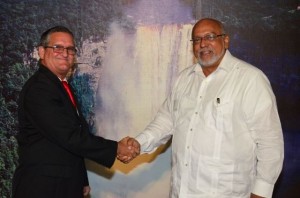
The Guyana government sees Cuba’s pro-tempore chairmanship of the Community of Latin American and Caribbean States (CELAC) as the means by which advocacy for integration can be further strengthened.
President Donald Ramotar conveyed this aspiration to new Cuban Ambassador to Guyana Julio Cesar Gonzales Marchante after he presented his letter of credence to the Guyanese head-of-state at the Office of the President on Monday.
Marchante replaces Raul Gortázar Marrero.
“I am convinced that it is only through integration and cooperation that our people would be able to address the many challenges of surviving and enhancing in an increasingly hostile and unpredictable international environment,” President Ramotar said.
Shortly after winning the November 2011 general elections, President Ramotar sent a message to the fourth Caricom-Cuba Summit in Trinidad and Tobago, lobbying Cuba’s chairmanship of CELAC, a Government Information Agency (GINA) release said.
Cuban President Raul Castro assumed the protempore chairmanship of CELAC in January this year after it was formally handed over by Chilean President Sebastian Pinera at the end of a two-day summit focusing on the region’s association with the European Union (EU).
Castro had vowed to perform the duty of chairing CELAC in accordance with international law, the United Nations’ charter and the fundamental principles that govern the development of ties among nations.
Support for an end to the U. S.’s long blockade against Cuba continues to be the clarion call including from Guyana. It was again reiterated as Ambassador Marchante presented his letter of credence.
“We thank the consolidated vote in favour to the Cuban resolution calling for an end of this genocide and policy… during the speech delivered at the last United Nations General Assembly,” the ambassador conveyed to President Ramotar.
Guyana and three other Caribbean Community (Caricom) member states, Jamaica, Trinidad and Tobago and Barbados established diplomatic relations with Cuba shortly after the island gained independence in 1972.
It was described as an historic moment and a divergence from the status quo of diplomatic and trade relations considering that there was tremendous pressure from other countries.
Over those 21 years, the relationship between Guyana and Cuba has been built on the solid foundation of dynamic political dialogue, warm mutual respect and productive cooperation.
President Ramotar made reference to the Cuban scholarship programme which is today responsible for numerous Guyanese returning as trained doctors, computer and electrical engineers, agriculturists and architectural specialists.
The Guyana-Cuba partnership has also made possible the diagnostic and treatment centres at Diamond, Mahaicony, Suddie and Leonora, and the state-of-the-art ophthalmology hospital in Berbice.
At the multilateral level, the two countries share common positions on climate change and the environment, crime and international terrorism.



